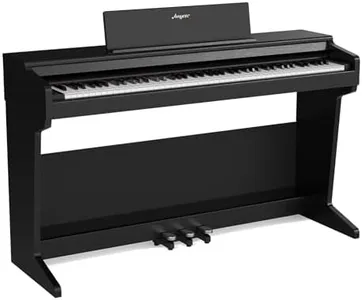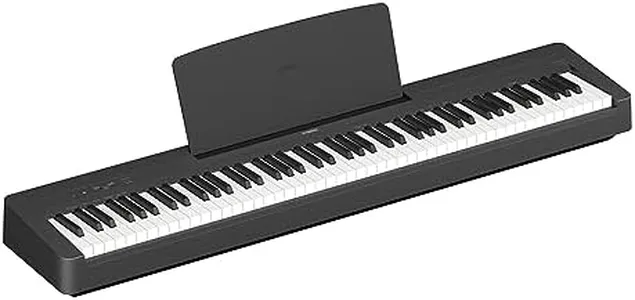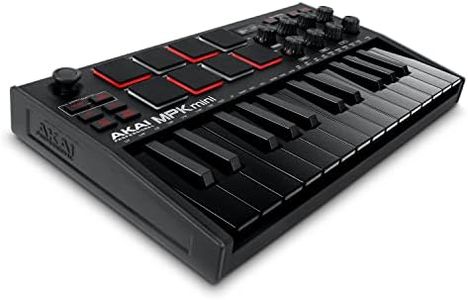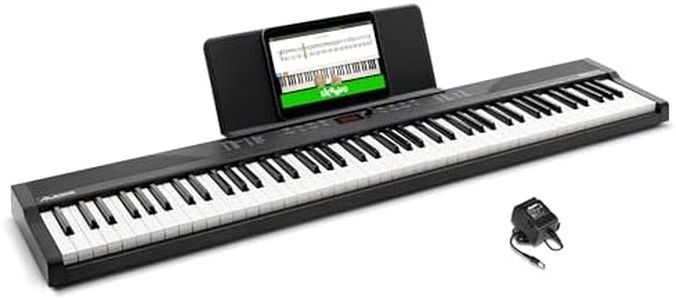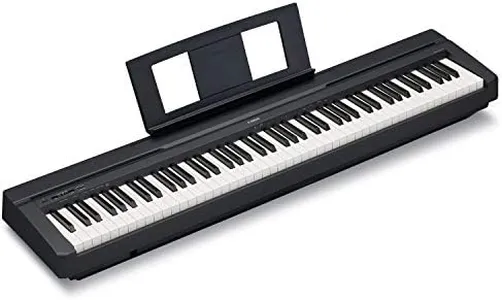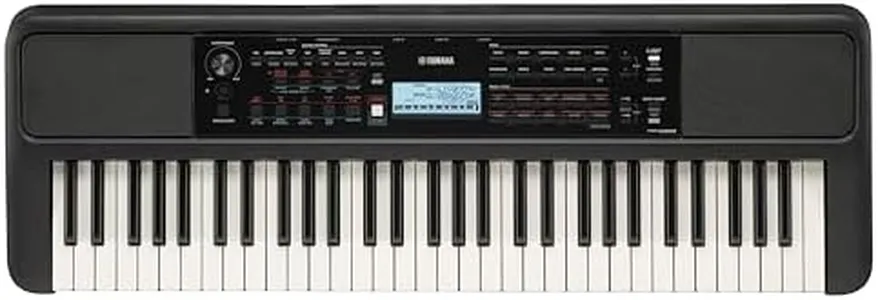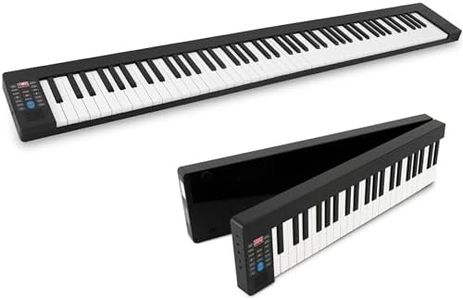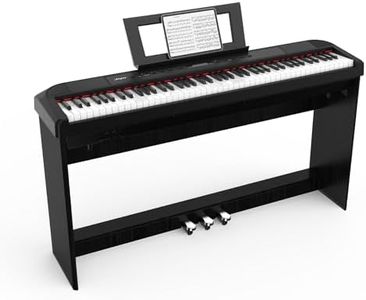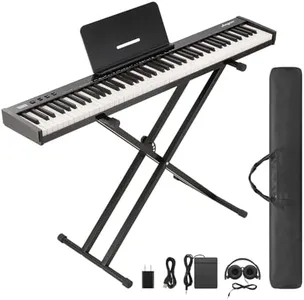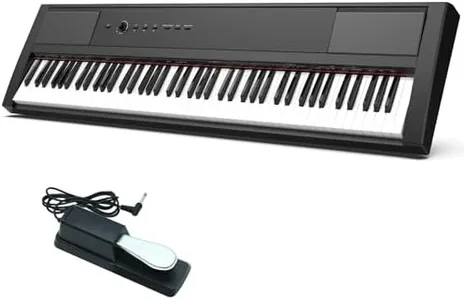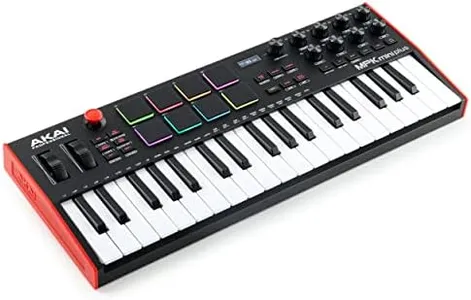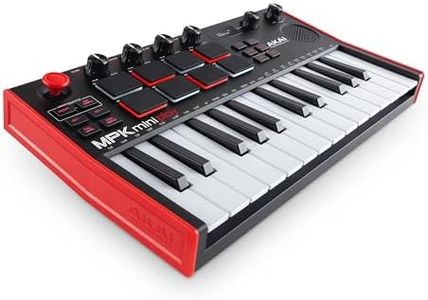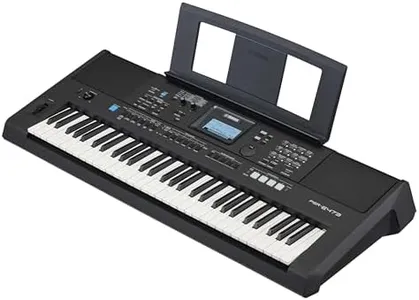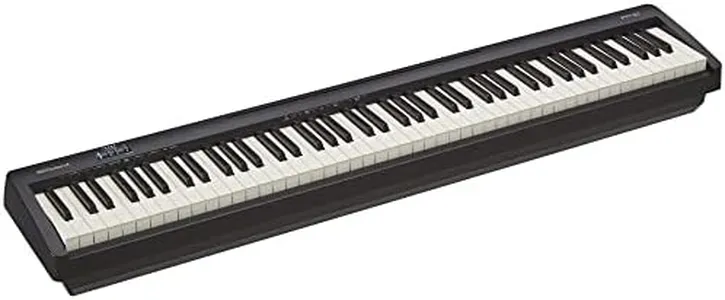10 Best Midi Piano Keyboards 2025 in the United States
Our technology thoroughly searches through the online shopping world, reviewing hundreds of sites. We then process and analyze this information, updating in real-time to bring you the latest top-rated products. This way, you always get the best and most current options available.

Our Top Picks
Winner
Yamaha, 88-Key Slim Digital Beginners with Weighted, Premium Grand Piano Sound, Compact Design, Music Rest, Sustain Pedal, and Built-in Speakers for Home Practice or Travel, (P143B)
Most important from
1826 reviews
The Yamaha P143B 88-Key Slim Digital Piano is an excellent choice for beginners and those looking for a high-quality, portable piano. One of its main strengths is the full 88 keys with weighted hammer action, which mimics the feel of an acoustic piano, providing a good learning and playing experience. The sound quality is impressive, with 10 unique voices, including premium grand piano samples, ensuring a realistic and rich audio experience. The built-in speakers add convenience, making it suitable for home practice without needing external speakers. The slim and compact design, weighing just 24.5 pounds, makes it easy to move and store, which is perfect for those with limited space or who need a portable option.
Connectivity is also well-covered with a USB port and a headphone jack, allowing for quiet practice and easy connection to devices or music software like SmartPianist. However, it lacks advanced controls and pads that some other models might offer, which could be a limitation for more experienced users seeking additional functionality. The included accessories such as the music rest and sustain pedal are great for beginners, but the one-button control might feel too simplistic for those wanting more control over settings. Despite these minor drawbacks, the Yamaha P143B stands out for its build quality, ease of use, and realistic piano experience, making it an excellent choice for home practice or travel.
Most important from
1826 reviews
Akai Professional MPK Mini MK3 - 25 Key USB MIDI Keyboard Controller With 8 Backlit Drum Pads, 8 Knobs, Music Production Software and Native Instruments Sound Package (NKS Integration), Black
Most important from
27916 reviews
The AKAI Professional MPK Mini MK3 is a compact and versatile MIDI keyboard controller ideal for music producers and beat makers. With 25 velocity-sensitive mini keys, the keyboard is responsive and suitable for playing melodies and basslines, although the smaller keys might feel cramped for those with larger hands.
The USB-powered device makes it easy to connect to a laptop or desktop, facilitating a simple setup process without the need for additional power sources. Featuring 8 backlit, velocity-sensitive drum pads, it allows for intricate beat programming and sample triggering, adding a tactile element to your production workflow. The 8 360-degree knobs provide extensive control over virtual instruments and effects, making it easier to tweak and shape sounds.
Additionally, the innovative 4-way thumbstick offers dynamic pitch and modulation control, enhancing expressive playability. It comes with a suite of music production software, including MPC Beats and several virtual instruments, which is great for beginners looking to dive into music production right away without needing to invest in additional software. The build quality is decent, with a plastic body that keeps the unit lightweight and portable, easy to carry to sessions or gigs. However, the lightweight plastic construction may not be as durable as sturdier models, so users should handle it with care. The included arpeggiator and the ability to customize settings through the downloadable editor add extra layers of flexibility and creativity. Perfect for on-the-go producers or those with limited studio space, this MIDI controller packs a lot of features into a small, portable package.
Most important from
27916 reviews
Alesis 88 Key Keyboard Piano with 480 Sounds, Speakers, USB MIDI, Sheet Music Tablet Rest, Power Adapter and Piano Lessons for Beginners
Most important from
765 reviews
The Alesis 88 Key Keyboard Piano is designed with beginners in mind, offering a range of features that make it an excellent practice instrument. With 88 full-size, touch-sensitive keys, it closely simulates an acoustic piano, helping users build finger strength and dexterity. The keyboard is portable and lightweight, making it easy to carry around, and its built-in speakers provide a rich sound, enhancing the playing experience.
The massive sound library with 480 sounds and 160 rhythms allows for diverse music creation, and the various educational modes, including split, lesson, and record modes, are very useful for both students and teachers. The USB-MIDI connectivity enables easy integration with recording and educational software, adding to its versatility. Additionally, it comes with useful accessories like a sheet music stand and a power adapter.
However, some potential drawbacks include the reliance on batteries for portability, which might not be convenient for everyone, and the lack of sophisticated pads and controls that might be found on more advanced keyboards. The build quality is generally solid, but being lightweight, it might not be as sturdy as heavier models. This keyboard is a great option for beginners and those looking for a portable practice piano, though those seeking a more professional setup might find it lacking in advanced features.
Most important from
765 reviews
Buying Guide for the Best Midi Piano Keyboards
Choosing the right MIDI piano keyboard can greatly enhance your music production and performance experience. MIDI keyboards come in various sizes and with different features, so it's important to understand what each specification means and how it can impact your use. By considering your specific needs and preferences, you can find a MIDI keyboard that fits you perfectly.FAQ
Most Popular Categories Right Now
